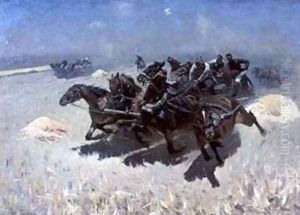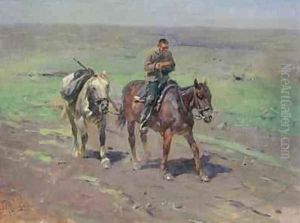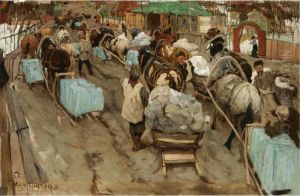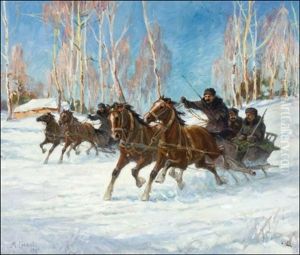Mitrofan Borisovic Grekov Paintings
Mitrofan Borisovich Grekov was a pioneering Russian and Soviet artist, renowned for establishing the genre of battle painting in Soviet art. Born on October 16, 1882, in the city of Voronezh, Russia, Grekov's journey into the world of art began at a young age, influenced by his surroundings and the rich cultural heritage of his homeland. His early education in art took him through various institutions, where he honed his skills and deepened his understanding of artistic expressions.
After completing his studies, Grekov's artistic career took a significant turn during World War I, where he served in the Russian army. The experiences and horrors of war profoundly impacted him, shaping his future path as an artist. Post-war, Grekov found his calling in depicting military subjects, combining his firsthand experience with his artistic talent. This unique blend allowed him to capture the essence of military life and battles with remarkable authenticity and emotional depth.
In 1920, recognizing the need for a specialized approach to depicting military themes, Grekov founded the first studio dedicated to war artists in Moscow. This studio played a crucial role in training artists to accurately represent military subjects, thus laying the foundation for the genre of battle painting in the Soviet Union. Grekov's work during this period was not only about capturing the events on the battlefield but also about celebrating the heroism and sacrifice of the Soviet people.
Grekov's contribution to Soviet art was immense. Through his paintings, he provided a vivid narrative of the Soviet Union's military history, from the Civil War to the early stages of World War II. His works were characterized by their dynamic composition, vivid portrayal of emotions, and meticulous attention to detail, especially in the depiction of military uniforms and equipment. Grekov managed to elevate battle painting to a form of high art, recognized for its artistic value as well as its ideological significance.
Despite his success, Grekov's life was cut short when he died on October 24, 1934. His legacy, however, lived on through his students and the war artists' studio he founded, which continued to influence generations of Soviet artists. Today, Mitrofan Borisovich Grekov is remembered not only as the father of Soviet battle painting but also as a significant figure in the broader landscape of Russian art, whose works continue to be admired for their historical importance and artistic merit.



